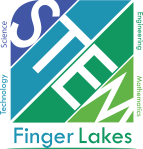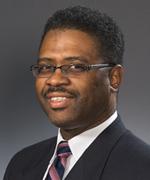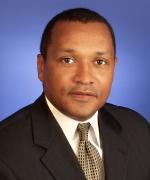
Members of the Finger Lakes STEM Hub Steering Committee met with Regents Andrew Brown and Wade Norwood in separate meetings over the past few weeks to talk about the upcoming science learning standards and other STEM issues. Dr. Joseph Marinelli, the new director of the Finger Lakes STEM Hub, described the group as a “catalyst for collaboration” in the greater Rochester region that brings K-12 schools, colleges and universities, and the many STEM-focused industries of the area to the table. “We bring together a diverse group of people,” Dr. Marinelli explained, “all focused on college and career readiness for students, and that has had a profound impact on STEM in the Finger Lakes region.” The opportunity to also include a broader state perspective from two Regents took the conversations to new heights.

Regent Norwood
Both Regent Brown and Regent Norwood described STEM issues as some of the most critical for the educational future of New York State. “We are entering a period of incredible uncertainty,” Regent Norwood warned in reference to new members of the Board of Regents, continuing disruption around APPR issues, and the upcoming changes to science standards. Speaking further about the standards, Regent Norwood also cautioned that “the Next Generation Science Standards have been very tricky for New York State. In some ways they represent what people are scared about in a state wide adoption of a national approach.” The real concern here is that the national standards might be watered down compared to where New York can and is going. “It is wise to move slowly,” Regent Norwood said, “to engage with the field to make sure that as we adopt our vision of Next Gen [Science Standards] we aren’t going backwards in any areas.”

Regent Brown
The need to move forward also resonated in Regent Brown’s remarks. “There are many reports of STEM field jobs that cannot be filled. Can’t be filled now, and we are adding more jobs.” Regent Brown was cautiously optimistic for a rollout of the new state science standards in the next few months. “It seems like the science world has been looking at science standards in New York forever,” he said, “and that is a blessing and a curse.” Regent Brown was pleased with the incredible opportunities for involvement from the field through surveys and planning groups, but noted that the time had come for action. “We are getting final feedback, and once this survey completes there will be a report back to the Board of Regents. Then the hope is to move forward swiftly.” His optimism comes from a lack of pushback from the field regarding the current draft standards – a situation he credits to the long term involvement of stakeholders.
When the conversations turned to science teachers, both of the Regents noted the need for new pathways for certification that would allow STEM professionals to fill empty teaching positions. “I love science, I read about science, I follow science, but I can’t teach science,” Regent Brown stated. “We need teachers certified in the areas they teach.” At the same time, Regent Brown also called for “better ways of linking what is going on in the classroom with the real world.” He praised the efforts of the STEM Hub around industry visits noting that “bringing teachers out into the real world is a constant reminder of what students need.” Regent Norwood echoed this, calling for a renewed focus on the multiple pathways to graduation and the importance of career readiness as well as college readiness. “Focusing on school to career,” he said, “is not relegating people to lower class lives but rather opens the door for young people to have an entering wage in a career without incurring massive debt from a four year degree that isn’t being used.”
The underlying issue is that of student readiness as they enter a global society and prepare to compete in a global economy. “Readiness is quite frankly of more concern to me than graduation rates,” Regent Brown noted, “We could have 90%, even 100% graduation rate but if students are not ready for what comes next it is a meaningless piece of paper.” Regent Norwood called for Boards of Education to pledge support for STEM and STEAM and not to give in to the pressure to compete around test scores. “The song running through my head keeps my mind occupied and not the idle playground of the devil as my mother would say,” Regent Norwood said. “By sixth grade,” he challenged, “all students must understand the scientific method of inquiry and the world around them.” This includes, he went on to explain, more outdoor experiences to counter the “nature deficit disorder” he sees in many children as well as a continued need for exposure to arts and music.
In terms of outcomes, both conversations left the STEM Hub with new action items to work towards. Regent Brown encouraged the STEM Hub to continue “making connections between the education world.” This includes, he noted, “formalized connections between schools and businesses with teams of committed volunteers who understand education needs and know community resources to bridge the gap and bring services to where they are needed.” Regent Norwood welcomed greater involvement from STEM professionals in crafting the instructional materials for the new science standards. “The Social Studies Framework shows that moving to a more compelling curriculum with a more rigorous approach works against the bubble sheet regime,” Regent Norwood claimed. “Going for rigor,” he cautioned, “means going for rigor not only on the part of the students but also the adults that fund and run the education system.” Regent Norwood strongly supported the idea of the STEM Hub being involved in a collaborative effort between education and industry in the Rochester region to build new instructional materials using open source content and resources from providers like CK12.org.
Christopher Harris is the Director of the School Library System of the Genesee Valley Educational Partnership and a Fellow for Youth and Technology Policy Issues with the American Library Association. He is an active participant on the STEM Hub Steering Committee.



 Posted by tammybon
Posted by tammybon